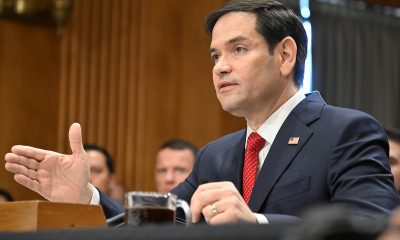U.S. Supreme Court
DeSantis administration appeals ruling against drag ban to US Supreme Court
11th Circuit previously struck down law

Republican Florida Gov. Ron DeSantis’ administration on Tuesday filed an emergency stay motion to the U.S. Supreme Court in an effort to enforce restrictions on drag shows in the state.
Two weeks ago the Atlanta-based 11th U.S. Circuit Court of Appeals upheld a lower court ruling that the Protection of Children Act posed a threat to constitutionally-protected free speech and expression and affirmed that the block of the law would stand for the entire state of Florida.
In the 167-page filing to the Supreme Court, Florida Solicitor General Henry Whitaker wrote referring the the decision upheld by the 11th Circuit: ”As long as the district court’s preliminary injunction remains in place, Florida is powerless to enforce a law its elected representatives have enacted for the protection of its children.”
Florida had been the site of several enforcement threats against drag events, prompting some Pride celebrations to cancel their parades out of concern over the drag laws being weaponized against them.
In June, U.S. District Judge Gregory Presnell in his 24-page ruling noted: “The state claims that this statute seeks to protect children generally from obscene live performances. However, as explained [in court filings], Florida already has statutes that provide such protection.”
The 11th Circuit in its ruling upholding Presnell wrote: “There are also important practical reasons to let the injunction stand pending a full trial on the merits. First, the potential harms from reversing the injunction outweigh those of leaving it in place by mistake. Where a prosecution is a likely possibility, yet only an affirmative defense is available, speakers may self-censor rather than risk the perils of trial. There is a potential for extraordinary harm and a serious chill upon protected speech. The harm done from letting the injunction stand pending a trial on the merits, in contrast, will not be extensive. No prosecutions have yet been undertaken under the law, so none will be disrupted if the injunction stands. Further, if the injunction is upheld, the government in the interim can enforce obscenity laws already on the books.”
The emergency application was submitted to Justice Clarence Thomas, who presides over appeals from the 11th Circuit.
U.S. Supreme Court
Supreme Court to consider bans on trans athletes in school sports
27 states have passed laws limiting participation in athletics programs

The U.S. Supreme Court on Thursday agreed to hear two cases involving transgender youth challenging bans prohibiting them from participating in school sports.
In Little v. Hecox, plaintiffs represented by the ACLU, Legal Voice, and the law firm Cooley are challenging Idaho’s 2020 ban, which requires sex testing to adjudicate questions of an athlete’s eligibility.
The 9th U.S. Circuit Court of Appeals described the process in a 2023 decision halting the policy’s enforcement pending an outcome in the litigation. The “sex dispute verification process, whereby any individual can ‘dispute’ the sex of any female student athlete in the state of Idaho,” the court wrote, would “require her to undergo intrusive medical procedures to verify her sex, including gynecological exams.”
In West Virginia v. B.P.J., Lambda Legal, the ACLU, the ACLU of West Virginia, and Cooley are representing a trans middle school student challenging the Mountain State’s 2021 ban on trans athletes.
The plaintiff was participating in cross country when the law was passed, taking puberty blockers that would have significantly reduced the chances that she could have a physiological advantage over cisgender peers.
“Like any other educational program, school athletic programs should be accessible for everyone regardless of their sex or transgender status,” said Joshua Block, senior counsel for the ACLU’s LGBTQ and HIV Project. “Trans kids play sports for the same reasons their peers do — to learn perseverance, dedication, teamwork, and to simply have fun with their friends,” Block said.
He added, “Categorically excluding kids from school sports just because they are transgender will only make our schools less safe and more hurtful places for all youth. We believe the lower courts were right to block these discriminatory laws, and we will continue to defend the freedom of all kids to play.”
“Our client just wants to play sports with her friends and peers,” said Lambda Legal Senior Counsel Tara Borelli. “Everyone understands the value of participating in team athletics, for fitness, leadership, socialization, and myriad other benefits.”
Borelli continued, “The U.S. Court of Appeals for the Fourth Circuit last April issued a thoughtful and thorough ruling allowing B.P.J. to continue participating in track events. That well-reasoned decision should stand the test of time, and we stand ready to defend it.”
Shortly after taking control of both legislative chambers, Republican members of Congress tried — unsuccessfully — to pass a national ban like those now enforced in 27 states since 2020.
U.S. Supreme Court
Supreme Court upholds ACA rule that makes PrEP, other preventative care free
Liberal justices joined three conservatives in majority opinion

The U.S. Supreme Court on Friday upheld a portion of the Affordable Care Act requiring private health insurers to cover the cost of preventative care including PrEP, which significantly reduces the risk of transmitting HIV.
Conservative Justice Brett Kavanaugh authored the majority opinion in the case, Kennedy v. Braidwood Management. He was joined by two conservatives, Chief Justice John Roberts and Justice Amy Coney Barrett, along with the three liberal justices, Sonia Sotomayor, Elena Kagan, and Ketanji Brown-Jackson.
The court’s decision rejected the plaintiffs’ challenge to the Affordable Care Act’s reliance on the U.S. Preventative Services Task Force to “unilaterally” determine which types of care and services must be covered by payors without cost-sharing.
An independent all-volunteer panel of nationally recognized experts in prevention and primary care, the 16 task force members are selected by the secretary of the U.S. Department of Health and Human Services to serve four-year terms.
They are responsible for evaluating the efficacy of counseling, screenings for diseases like cancer and diabetes, and preventative medicines — like Truvada for PrEP, drugs to reduce heart disease and strokes, and eye ointment for newborns to prevent infections.
Parties bringing the challenge objected especially to the mandatory coverage of PrEP, with some arguing the drugs would “encourage and facilitate homosexual behavior” against their religious beliefs.
U.S. Supreme Court
Supreme Court rules parents must have option to opt children out of LGBTQ-specific lessons
Mahmoud v. Taylor case comes from Montgomery County, Md.

The U.S. Supreme Court on Friday ruled that public schools must give advance notice to parents and allow them the opportunity to opt their children out of lessons or classroom instruction on matters of gender and sexuality that conflict with their religious beliefs.
Mahmoud v. Taylor was decided 6-3 along party lines, with conservative Justice Samuel Alito authoring the majority opinion and liberal Justices Sonia Sotomayor, Elena Kagan, and Ketanji Brown-Jackson in dissent.
Parents from diverse religious backgrounds sued to challenge the policy in Maryland’s Montgomery County Public Schools when storybooks featuring LGBTQ characters were added to the elementary school English curriculum in 2022.
The school board argued in the brief submitted to the Supreme Court that “the storybooks themselves do not instruct about gender or sexuality. They are not textbooks. They merely introduce students to characters who are LGBTQ or have LGBTQfamily members, and those characters’ experiences and points of view.”
Advocacy groups dedicated to advancing free speech and expression filed amicus briefs in support of the district.
PEN America argued the case should be viewed in the context of broader efforts to censor and restrict what is available and allowable in public schools, for instance by passing book bans and “Don’t Say Gay” laws.
The ACLU said the policy of not allowing opt-outs is religion-neutral, writing that the Supreme Court should apply rational basis review, which requires only that the school district show that its conduct was “rationally related” to a “legitimate” government interest.
LGBTQ groups also objected to the challenge against the district’s policy, with many submitting amici briefs including: the National Center for Lesbian Rights, GLAD Law, Family Equality, COLAGE, Lambda Legal, the Leadership Conference on Civil and Human Rights, PFLAG., and the National Women’s Law Center.
The Human Rights Campaign did not submit a brief but did issue a statement by the group’s President Kelley Robinson: “LGBTQ+ stories matter. They matter so students can see themselves and their families in the books they read–so they can know they’re not alone.”
“And they matter for all students who need to learn about the world around them and understand that while we may all be different, we all deserve to be valued and loved,” she said. “All students lose when we limit what they can learn, what they can read, and what their teachers can say. The Supreme Court should reject this attempt to silence our educators and ban our stories.”


















